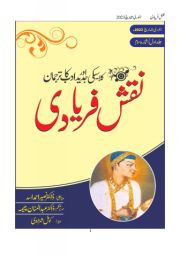پنڈت برجموہن دتاتریہ کیفی
ادھر کئی مہینوں سے علم و ادب کے اکابر کی موت کا ایسا سلسلہ قائم ہے کہ کوئی مہینہ ناغہ نہیں جاتا جس میں کسی نہ کسی صاحبِ علم کا ماتم نہ کرنا پڑتا ہو، ان میں سب سے بڑا حادثہ پنڈت برجموہن و تاتریہ کیفی کی وفات کا ہے، اگرچہ ان کی عمر نوے سال سے زیادہ ہوچکی تھی، مگر وہ ہماری مشترک تہذیب کی بڑی اہم یادگار تھے، اور انکی موت سے اس کا ایک بڑا ستون گرگیا، ان کی ذات میں اس تہذیب کی تمام خوبیاں اور وضعداریاں جمع تھیں، اردو زبان سے ان کو عشق تھا،اور اس کے وہ بڑے ماہر ومحقق تھے، اور اس کی باریکیوں پر ان کی بڑی گہری نظر تھی، جس پر ان کی نثر و نظم کی تصانیف شاہد ہیں، اس لیے ان کی موت ایک بڑا ادبی و تہذیبی حادثہ ہے۔
وہ نصف صدی سے زیادہ اپنے قلم و زبان سے اردو کی خدمت کرتے رہے، اور سر دو گرم کسی دور میں بھی ان کا قدم پیچھے نہ ہٹا، حتی کہ اس دور میں بھی جبکہ فرقہ پرستی نے اردو کی حمایت کو ایک قومی جرم بنادیا ہے، اور ہندووں میں جو لوگ اردو کو اپنی مادری زبان سمجھتے ہیں اور دل سے اس کے حامی ہیں، وہ بھی بہت کم اس کے اظہار کی جرأت کرسکتے ہیں، اردو کی وفاداری پر جو لوگ قائم رہ گئے ہیں، ان میں پنڈت کیفی سب سے نمایاں تھے، وہ برابر اس کے لیے سینہ سپر رہے، اور جب تک ان میں لکھنے پڑھنے اور چلنے پھرنے کی سکت باقی رہی وکالت کرتے رہے، انجمن ترقی اردو ہند کے نائب صدر تھے مگر ادھر چند سال سے ضعف پیری نے بالکل معذور کردیا تھا، ان کی پوری زندگی علمی ادبی مشاغل میں گذری اور اردو...
هدفت الدراسة لمعرفة العوامل التقنية على فاعلية وكذل كفاءة البيانات المحاسبية في البنوك الكويتي وكيف تؤثر العوامل القانونية وكذلك الضوابط المهنية على فاعلية وكفاءة البيانات المحاسبية في البنوك الكويتية وكيف تؤثر العوامل الإدارية على فاعلية وكفاءة البيانات المحاسبية المحوسبة في البنوك الكويتية وكيف تؤثر العوامل الثقافية والاجتماعية على فاعلية وكفاءة البيانات المحاسبية في البنوك الكويتية وكيف تؤثر العوامل الاقتصادية على فاعلية وكفاءة البيانات المحاسبية في البنوك الكويتية، تكون مجتمع الدراسة من العاملين في الدوائر أو الأقسام التي تركز في أدائها لعملها على أنظمة البيانات المحاسبية في البنوك في الكويت وعددهم 120، اعتمدت الدراسة على المنهج الوصفي التحليلي، وأسفرت النتائج بأن البيانات المحاسبية المحوسبة ذات فاعلية عالية مما يعني أن المصارف التجارية في الكويت تعمل على زيادة الاهتمام بنظم المعلومات من منطلق دورها الأساسي في زيادة فاعلية وكفاءة تلك النظم، وأوصت الدراسة بالعمل على توسيع دائرة الاستفادة من البيانات المحاسبية المصرفية لتشمل كافة الإدارات والأقسام والأنظمة الفرعية والربط بين فروع المصارف وتمكين عملائها من تحقيق أقصى درجات الاستفادة منها
This study is confined to identify novel non-edible oil seeds as renewable feedstock for eco-friendly biodiesel synthesis. In this project nine novel non-edible oil seeds have been investigated systematically including collection, morphological identification and scanning electron microscopic studies, oil contents estimation, oil extraction, biodiesel synthesis, optimization, characterization and fuel properties analysis in comparison with international biodiesel standard that is GB/T (20828), American (ASTM D-6751, ASTM D-951) and European standards (EN-14214). The non-edible oil seeds used in this study includes Raphanus raphanistrum L., Prunus Cerasoides D. Don., Celastrus paniculatuswilld., Lepidium perfoliatum L., Corylus colurna L., Datura metel auctt. non L. sensu Clarke, Capparis spinose L., Pistacia chinensis ssp. Integerrima (J.L. Stewart) Rech., and Sinapis arvensis L. Nine different catalysts, categories into three groups i.e clay based catalyst (single metal base, clay metal hybrid composites, clay and metal oxide), metal complex and metal organic framework complex, were synthesized using in-situ wet impregnation method and reflux transesterification procedure was used for synthesis of biodiesel. Additionally, reusability study of synthesized catalysts was also done. All the oil seeds have low acid value (> 3% FFA) required for transesterification except Celastrus paniculatus seed oil (2.98 mg / KOH). Therefore, in case of Celastrus paniculatus acid esterification, involving use of sulphuric acid (1% H2SO4) as catalyst was employed to reduce its acid value prior to transesterification. In addition, optimization of different transesterification variables was carried out using Response Surface Methodology (RSM) built on Box-Benken Design. Results showed that maximum biodiesel yield (90.2%) was recorded for Capparis spinosa using Cu-Ni doped ZrO2 catalyst (1: 12 oil to methanol ratio, 2.5% catalyst amount, at 70 oC for 1.5 h) followed by Sinapis arvensis (90%) with Zr-MOF-67 (9: 1 oil to methanol ratio, 1.5% catalyst amount, at 70 oC for 2.5 h) and Celastrus paniculatus (89.42%) using trimetallic (Ce, Cu, La) loaded montmorillonite clay catalyst (1:12 oil to methanol ratio, 3.5% catalyst amount, at 120°C for 3 h). While, the lowest biodiesel yield was observed for Raphanus raphanistrum (83%) with Cu loaded montmorillonite clay catalyst (1:12 oil to methanol ratio, 4% catalyst amount, at 150°C for 5 h). These findings clearly depict that all the synthesized catalysts (Cu-Mmt, Cd-Mn-Mmt, Ce-Cu-La-Mmt, ZrOBT, Ni-BT, Mn-BT, Cu-Ni doped ZrO2, Co-Cr doped ZrO2 and Zr-MOF-67) were novel, active, and reusable during the process of transesterification for efficient conversion of seed oil to higher biodiesel yield. Based on these experimental findings the feedstock used in this project as raw material is novel, economically feasible and should be used for commercial production at mass scale. The study further recommends the mass cultivation of such feasible novel non- edible feedstock at global perspective to produce biodiesel at industrial level.



